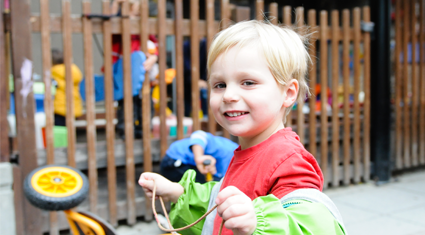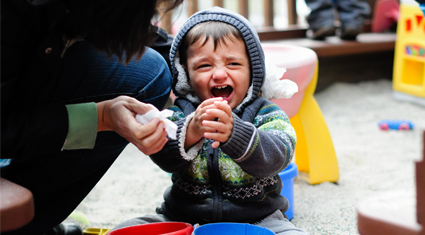
Every parents wants their child to be happy and healthy. Research shows that one of the key indicators of a child’s future quality of life is their emotional maturity. You can set your child up for future physical and emotional health by teaching him or her the ability to understand, use, regulate, and manage their emotions.
As noted in a 2013 New York Times article, “...studies have found that kids who develop these [noncognitive] skills are not only more likely to do well at work but also to have longer marriages and to suffer less from depression and anxiety. Some evidence even shows that they will be physically healthier.” A 2011 study of data on 17,000 British infants followed over 5 decades found that a child’s mental health correlated strongly with his or her future happiness.

Even when researchers took into account the effects of poverty, race, having teenage parents, family stress and neighborhood crime, the profound correlation between early emotional maturity and future life satisfaction remains.
The hallmarks of emotional intelligence quotient, or EQ, are emotional regulation, self-awareness, acceptance, and self-motivation. Children with high EQ are also adept at reading the emotional cues of others; in other words, they are empathetic and have healthy interactions with others. They are less likely to have eating disorders, self-medicate with drugs, or have impulsive behaviours.
Emotional maturity also gives your child a big head start in the classroom. Marc Brackett, a senior research scientist in psychology at Yale University notes, “....emotions can either enhance or hinder your ability to learn. They affect our attention and our memory. If you’re very anxious about something, or agitated, how well can you focus on what’s being taught?”

The foundation for a child’s emotional maturity begins with you, the parent. You can boost your child’s EQ in a number of ways, including:
- Listening - Your child needs to feel understood. Acknowledging his or her feelings, and naming them, helps them to build a healthy framework for working through difficult emotions. Like anyone, you child also needs to be heard before he or she can let the bad feelings go.
- Modelling - It’s easy to be scared or anxious when your child is feeling the same, but children are highly sensitive to your feelings; be calm when soothing your child. In daily life, show your child best practices for being calm and steady in the face of challenges. Your maturity establishes an example they’ll follow in their emotional development.
- Coaching - Not all problems will be easy to solve, and sometimes your child will need your help to find a solution. Brainstorm together, but empower your child to take the lead. Also reflect together on how she or he responds to stress: does her body clench? Does his breath become quicker? Being aware of the physical response will help her recognize stress when it happens.
- Playing - When your child is feeling the weight of big emotions, one of the most effective things to do is shift their energy. If appropriate, address the problem as a game; or take a time out and move together. Taking a break to play shows your toddler that challenging feelings are passing, and relieves stress that may be a roadblock.
Early emotional maturity will benefit your child for life, not just in their academics. Who hasn’t had to manage stress in the workplace, fear in a job interview, or conflict in a relationship? Cultivate your child’s emotional maturity and you are giving them the gift of a healthy outlook on life.
How did you learn the emotional intelligence you possess? Tell us in the comments section below or join the conversation on Facebook!
This post is part of a month-long series on early child development for the YWCA Power of Play campaign. Throughout September, we’ll share resources, advice, tips and activities to help you ensure the kids in your life are school-ready. This week is all about physical health and well-being. Join the campaign - Sign up today!

